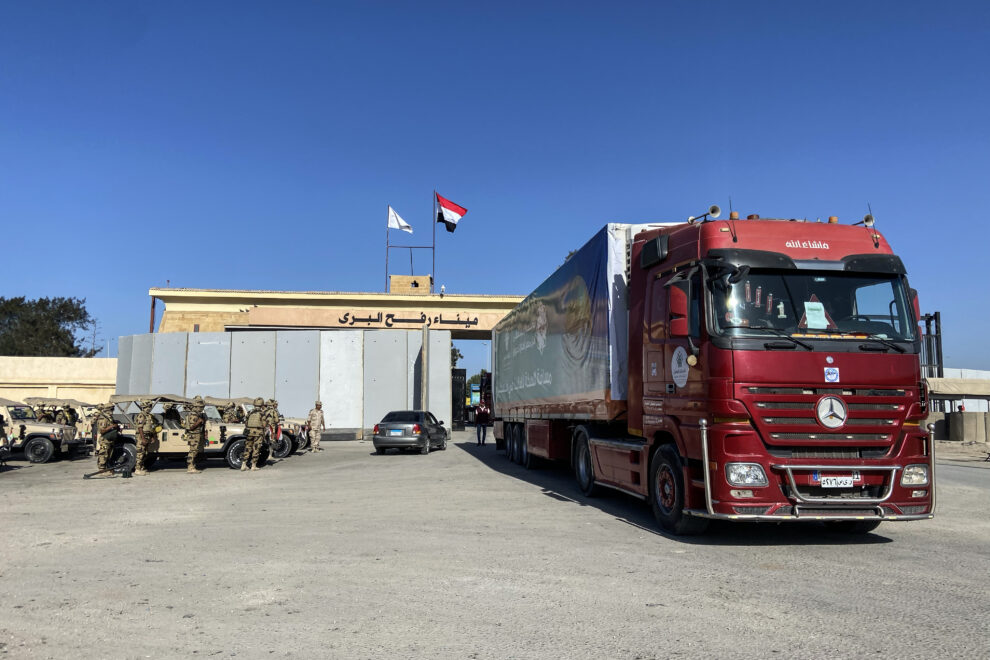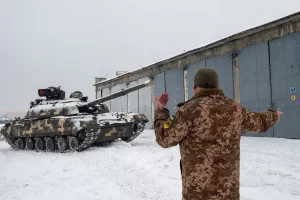The European Commissioner for Humanitarian Aid warned on Tuesday that support for civilians in Gaza must be stepped up « enormously, » urging all parties to open other entry points into the Palestinian enclave.
« What I want to call for is for safe and unrestricted access, for humanitarian aid to all people in Gaza, wherever they are who need this aid, » Janez Lenarčič told reporters.
His comments, delivered from the Ostend airport in Belgium where an EU-funded plane loaded with humanitarian aid destined for Gaza was preparing to take off, came a month after a devastating terrorist attack by the Hamas militant group resulted in the deaths of 1,400 Israelis with a further 200 kidnapped.
In retaliation, Israel has besieged the Palestinian enclave of more than 2.2 million inhabitants and launched a heavy campaign of bombardments that has killed more than 10,000 civilians, half of them children, according to the local Hamas-led authorities.
It has also led to « a dramatic, catastrophic humanitarian situation in the Gaza Strip, » Lenarčič said. « There is a need to scale up enormously the quantity of humanitarian aid. »
« It means that as many entry points as necessary need to be available, » he also said. « The international law requires from all parties involved in any armed conflict, including this one, to ensure that there is safe and unrestricted access for humanitarian aid. »
« This is the international legal obligations, and that includes opening the necessary number of entry points in order to make sure that there is sufficient quantity of humanitarian assistance being able to enter the Gaza Strip. »
Airbridge to run ‘as long as necessary’
The United Nations estimates that $1.2 billion (€1.1 billion) is required to deliver existing humanitarian services amid the ongoing hostilities. But humanitarian aid has trickled into the Strip at a glacial pace with just over 570 trucks crossing into the enclave since October 21, compared to an estimated 500 doing so daily before the latest escalation.
In response to the crisis, the EU has quadrupled its humanitarian support to Gaza and the West Bank to €100 million this year and launched an airbridge to carry much-needed supplies to Egypt which controls the only open land border crossing into Gaza, Rafah.
The plane leaving Ostend on Tuesday was the eighth one since the start of the airbridge operation three weeks ago and the last one on the current roster. Lenarčič said however that « we will continue with this airbridge as long as necessary. »
The flight was carrying 45 tonnes of medicines, medical equipment and food items.
Pierre Tripont, a logistics manager for the Commission’s Directorate-General for European Civil Protection and Humanitarian Aid Operations told Euronews whatever is sent is first approved by the Egyptian and Palestinian Red Crescent societies.
The Egyptian Red Crescent is the only organisation mandated by Cairo to handle humanitarian aid flowing into the country for Gaza, which they then deliver to their Palestinian counterpart at the Rafah crossing.
« We receive lists of products that are required, and even when we have requests, because we also have (EU) member states coming to us saying ‘we would like to donate this or that type of product’, we communicate this to the Egyptian Red Crescent and the Palestinian Red Crescent to first obtain their approval and validation that these products are indeed required. Then we can send them, » Tripont said.
« The idea is really to be able to create a coordinated flow of products to Gaza and not to clog up logistics areas with products that are not yet required, » he added.
Painful lack of fuel
But one product still not making its way into Gaza is fuel, which Israel is blocking over fears Hamas would use it to power new attacks against the country.
Lenarčič called for this blockade to be lifted, warning that « fuel is desperately needed » in the Gaza Strip to power hospitals, and desalination plants for water and bakeries.
Jamie LeSueur, head of the emergency operations for the International Federation of the Red Cross and Red Crescent Societies, told Euronews that two of the hospitals their NGOs run rely on fuel to operate.
« We’re hearing about patients at risk of being taken off of major life support systems because they don’t have access to fuel. Now, our national society is working extremely hard to maintain and ration, but at the end of the day, without unhindered access, we’re in a lot of trouble, » he said.
Supplying the Al-Quds hospital is also made difficult by its location, in the north of the Strip, which has been the target of most of Israel’s military intervention. Humanitarian trucks, LeSueur said, « have access primarily to the south » and making it to the northern part is » a major challenge. »
« Ultimately, the roads are inoperable. There are ongoing operations, » he said.
A maritime corridor that would be operated by Cyprus, the closest EU territory to the Gaza Strip, was backed by France and Greece late last month. European Commission chief Ursula von der Leyen said Monday her executive is looking into the feasibility of it.
Lenarčič noted however that while they are indeed « looking with interest » at the idea, « the problem with the maritime corridor is that at the moment there is no functioning port on the Gaza shore. »
« So this would need to be fixed somehow. »




































